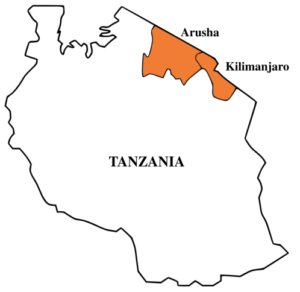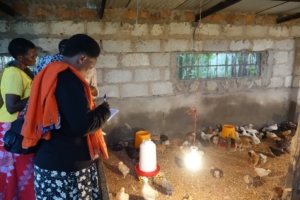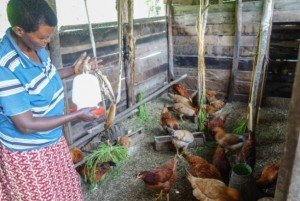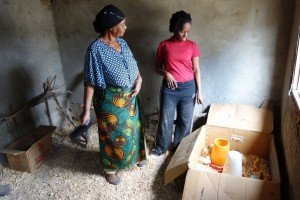In the regions of Arusha and Kilimanjaro, almost all farmers keep traditionally local chicken which give them a regular source of income at a lower cost. In recent years, new crossbreeds of laying hens have emerged in the agricultural landscape.
Aware of the performances and the economic potential of these new crossbreeds, but also of their cost, hygiene and feed requirements, 24 groups decided in 2016 to raise flocks of crossbred hens with their pilot farmers, with the objective of experiencing and possibly multiplying them for their members
Support to groups throughout the experiment
Thanks to the continuous support of field officers, farmers’ groups developed their projects. Several visits to chick providers gave poultry keepers all information about crossbreed’s characteristics to identify those best respond to their expectations. Then, with knowledge acquired during technical trainings, farmers defined their business plan, their production costs as well as responsibilities of every member.
Learning through practical
Implementation of farms was a rich learning experience. It is the case of Rebeca Mungure, pilot farmer and paravet*, who underlines the difficulties met with her fellow farmers for the feed supply:
‘crossbred hens consume much more than local ones! To reduce the cost, we prepare ourselves feed with ingredients bought separately or produced on our farms. Like this, we reduced feed cost more than 30 % while controlling the quality’
On her side, Mama Ndosi, also pilot farmer, faced mortality problems with the first chicks produced:
‘In spite of a good hygiene condition, we lost more than half of the first batch. We identified with our field officer that these new breeds are particularly sensitive to water quality. Since I boil it, we almost have no loss of chicks anymore.’
Towards the development of services to farmers …
After seeing for themselves performances as well as technical constraints of these crossbreeds, numerous members wish to make the leap and start their farm. Thus, 14 groups developed their own system to provide chicks to their members.
‘As soon as other members are ready, I incubate eggs with my local hens, explains Rebeca. Then, I assist them for vaccinations and for treatments if any complications. The rest of the time, eggs are sold to cover feed costs.’
Facing increasing demand, some chicken keepers as Mama Ndosi begins to set up their own service.
‘Now that I feel competent to rear crossbred chicks, I invested in an incubator for 50 eggs, what give me the possibility to supply a larger number of farmers in the village.’
*Since 2015, 28 groups’ members were trained as paravets to strengthen the animal health service in the regions of Arusha and Kilimanjaro. Their main mission is to ensure diseases prevention by assisting livestock keepers on hygiene, feeding, pest control and vaccination of animals.






